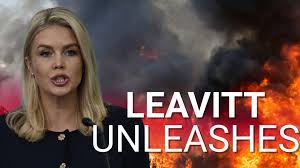The Heated Exchange That Sparked National Attention
A fiery moment unfolded recently when Karoline Leavitt Shuts Down Reporter Over L.A. Riot Lies, the Republican congressional candidate and former White House press aide, confronted a reporter who attempted to push a misleading narrative about the Los Angeles riots. The exchange quickly gained traction online, not just for its intensity but because it highlighted growing frustration among conservatives and independents alike over how major events are often framed by certain corners of the media.
Leavitt, who has been known for her sharp wit and unapologetic approach, refused to let the reporter’s claims go unchallenged. Instead, she dismantled the assumptions embedded in the question, forcing the conversation back to verifiable facts.
Karoline Leavitt Calls Out Media Misrepresentation
The Reporter’s Question That Triggered the Clash
During a press event, a reporter implied that recent unrest in Los Angeles was politically motivated and tied to conservative rhetoric. The phrasing of the question suggested blame without providing evidence. For many watching, it was a textbook example of how leading questions can shape public perception before the truth is even presented.
How Leavitt Responded with Facts and Firmness
Leavitt didn’t hesitate. She pointed out the inaccuracies, reminded the reporter of the actual circumstances surrounding the incident, and emphasized the importance of distinguishing between legitimate protests, isolated acts of violence, and the media’s tendency to lump them all together for political effect. Her response was calm, yet direct, showing her ability to stay composed under pressure while still taking a firm stance.
Why Her Pushback Resonated with Viewers
Clips of the exchange spread rapidly on social media, with supporters praising Leavitt for saying what many ordinary Americans feel: that the media too often twists events to fit a preferred narrative. Her refusal to back down not only energized her base but also sparked broader conversations about journalism standards and political bias.
Examining the Truth Behind the L.A. Riot Narrative
What Was Claimed by the Media
In the days following the unrest, several outlets described the events as a “right-wing inspired riot,” despite little evidence to support that framing. These claims were repeated across headlines, leaving many readers with a one-sided impression of what actually happened.
Evidence That Contradicts the “Official” Story
Eyewitness accounts, video footage, and police reports painted a far more complicated picture—one that didn’t align neatly with the early narratives. Rather than being tied to a single political movement, the unrest appeared to stem from localized frustrations, opportunistic looting, and a broader climate of social tension in the city.
Public Reactions to the Exposé
When Leavitt highlighted these discrepancies, it struck a chord. Many citizens, regardless of political affiliation, are growing tired of sensationalized reporting. Social media comments and opinion polls suggest that a large portion of the public craves straightforward reporting rather than spin.
The Bigger Debate: Media Accountability in Politics
Past Examples of Misleading Coverage
Leavitt’s confrontation is just the latest in a series of moments where politicians have accused the press of misrepresentation. From selective editing of interviews to misleading headlines, trust in traditional media has been steadily eroding for years.
The Growing Demand for Honest Reporting
More Americans are turning to independent outlets, podcasts, and direct social media updates to form their own opinions. This shift underscores a hunger for information that is not filtered through partisan lenses.
How Politicians Are Fighting Back
Figures like Leavitt are capitalizing on this distrust by directly addressing falsehoods in real time. By calling out inaccuracies on camera and refusing to back down, they position themselves as truth-tellers in an age of media skepticism.
What This Means for Future Political Coverage
The clash between Karoline Leavitt and the reporter may have been a single moment, but its implications reach far beyond one news cycle. It highlights the increasingly adversarial relationship between politicians and the press, while also exposing the public’s growing impatience with media narratives that don’t match reality.
As Leavitt continues her political journey, it’s clear that moments like this will only strengthen her brand as someone unafraid to challenge the media head-on. More importantly, it signals a larger trend: future political coverage will likely be judged less by what the media says, and more by whether the public believes it reflects the truth.
